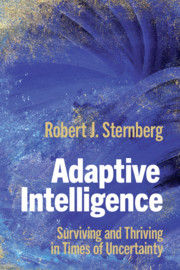Book contents
- Adaptive Intelligence
- Adaptive Intelligence
- Copyright page
- Dedication
- Contents
- Tables
- Preface
- Chapter 1 Introduction
- Chapter 2 What Is Intelligence? A Panoply of Views
- Chapter 3 Intelligence as the Broad Ability to Adapt to the Environment
- Chapter 4 Why General Intelligence May Be Unhelpful, or Detrimental, in Times of Instability, and for that Matter, in Other Times as Well
- Chapter 5 History of the Theory of Adaptive Intelligence
- Chapter 6 Measurement and Teaching of Adaptive Intelligence
- Chapter 7 Why Do People Persist in Species-Suicidal Beliefs and Practices and What’s to Be Done?
- Chapter 8 The Great Adaptive-Intelligence Test
- Index
Chapter 3 - Intelligence as the Broad Ability to Adapt to the Environment
Published online by Cambridge University Press: 21 January 2021
- Adaptive Intelligence
- Adaptive Intelligence
- Copyright page
- Dedication
- Contents
- Tables
- Preface
- Chapter 1 Introduction
- Chapter 2 What Is Intelligence? A Panoply of Views
- Chapter 3 Intelligence as the Broad Ability to Adapt to the Environment
- Chapter 4 Why General Intelligence May Be Unhelpful, or Detrimental, in Times of Instability, and for that Matter, in Other Times as Well
- Chapter 5 History of the Theory of Adaptive Intelligence
- Chapter 6 Measurement and Teaching of Adaptive Intelligence
- Chapter 7 Why Do People Persist in Species-Suicidal Beliefs and Practices and What’s to Be Done?
- Chapter 8 The Great Adaptive-Intelligence Test
- Index
Summary
During the twentieth century, IQs rose thirty points around the world (the so-called “Flynn effect”). These increases led to many positive consequences, such as more efficient burning of fossil fuels and development and use of ever more sophisticated cell phones. But the same habits that have brought many short-term benefits have proven to be powerfully destructive in the long term, as fossil-fuel use compounds global climate change and social media are used on cell phones to spread disinformation and hate-filled propaganda. People’s increasing so-called “general intelligence” seems to have been useless in leading them to guard adequately against the long-term destructive consequences of their behavior aimed at maximizing their short-term gains. They have compromised not only their own lives, but those of their children and grandchildren. Apparently, even genetic ties to future generations are not enough to prevent people from using their general intelligence to engage in species-destructive behavior, such that, ironically, their high levels of IQ may profit them in the short term but ultimately will destroy humanity and the species it takes down with it.
- Type
- Chapter
- Information
- Adaptive IntelligenceSurviving and Thriving in Times of Uncertainty, pp. 74 - 126Publisher: Cambridge University PressPrint publication year: 2021



